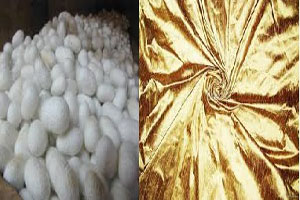
Steep fluctuation in silk prices witnessed in India
YarnsandFibers News Bureau 2015-08-14 16:00:00 – CoimbatoreClose to 810 sericulture farmers in Coimbatore district find themselves in state of despair due to the steep fluctuation in prices. Since June, the prices have been fluctuating so abruptly, that it even goes as low as Rs170 per kg. Unless the farmers sell it for a minimum Rs300 per kg, they are unable to feed their families.
Cocoon prices in the country declined by more than 60%, once the import duty on raw silk from China was reduced from 15% to 10% by the government. This allows weavers and silk dealers to buy raw silk from China, which is considered to be of superior quality, at almost the same price as that of domestic raw silk. The drop in demand experienced by silk yarn manufacturers is transferred to the sericulture farmers.
In Coimbatore district, where mulberry is cultivated and sericulture is practiced across 1,475 acres, the cost of producing 1 kg of good quality cocoon itself comes up to Rs230 a kg. Just the inputs like moths, fertilizers for mulberry and insecticides to keep the worms healthy, costs Rs100 a kg, said R Ramakrishnan, president of the Sericulture Farmers Association, Udumalpet.
In addition, they need to pay for labour to ensure the worms are fed twice a day and to help remove the cocoons when they are formed. Total costs work out to Rs230 in the city and Rs210 per kg in rural pockets.
With prices hovering at less than Rs250 per kg from mid-July, sericulture farmers are in despair. Ramakrishnan said that on one hand the governments want the farmers to increase their production and productivity; on the other hand they kill their profession by encouraging imports from China.
The fluctuating prices at the Coimbatore market has government officials worried too. Hardly 10% of the sericulture farmers come and sell their cocoons to the government, said assistant director of the sericulture department, S Palani Durai. Private dealers visiting the weekly market pay more than farmers. If private players bring down their auction prices, a huge percentage of farmers would hope to sell, and they would need more buyers on such days. Currently a large number of farmers transport and sell their cocoons in open markets like Dharmapuri, Hosur, Kollegal and Salem.
Fully formed and recently removed cocoons can't be left open for more than three days or refrigerated for more than 20 days, because they start rotting.
The peak season for cocoons is between December and February and again between June and August. Post-rains and pleasant weather is when prices peak and the quality is good.
Regular silk dealers who purchase cocoons on a daily basis from the sericulture department said that the Ramzan and Aadi season also led to fall in prices as most silk and yarn wholesalers are Muslims, and they don't work during Ramzan season.
According to the head of department of sericulture at Tamil Nadu Agricultural University, S V Krishnamurthy, India imports around 4,000 metric tonnes from China every year with the import duty fixed at 15%. Though India's requirement is around 26,000 metric tonnes annually, they produce only 23,000 tonnes.
Market Intelligence
Ask for free sample Report

experience
Customer Base
dedicated team
Countries Served Worldwide









